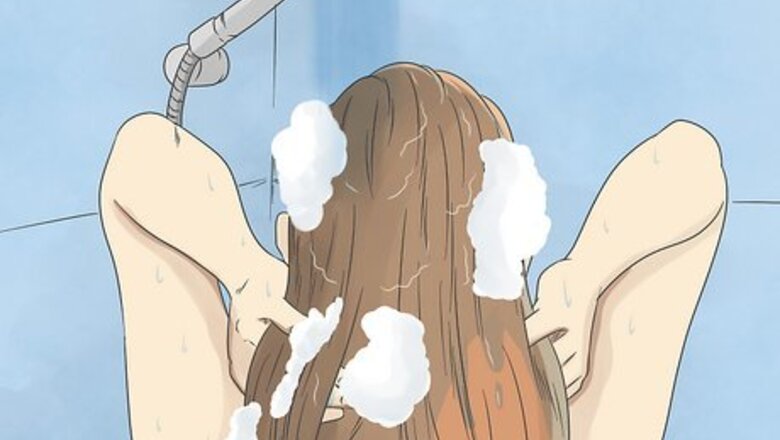
views
Letting Your Hair Air Dry
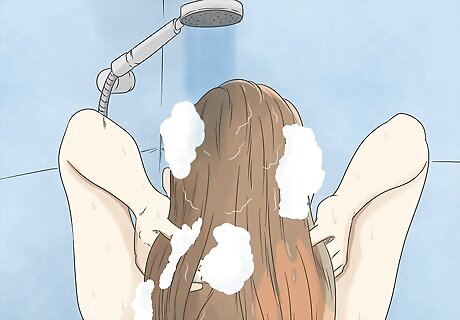
Wash your hair. Curly hair is often more dry than straight hair because the natural oils produced at the scalp have a hard time maneuvering their way through the twists of curly hair. The result is that these natural oils aren’t distributed throughout the hair, especially at the ends. This causes hair to be dry, and then break and become frizzy. If you wash your curly hair every day, use a moisturizing shampoo that will hydrate it to prevent it from breaking, and to reduce frizz, split ends and add shine. Choose a shampoo that’s either sulfate free or doesn’t contain ammonium lauryl sulfate, ammonium laureth sulfate or sodium lauryl sulfate. These are essentially powerful detergents that strip your hair and scalp of the natural oils your hair needs. Try to stay away from all products that contain alcohol, which sucks up hair’s moisture and gives curls that crunchy look and feel.
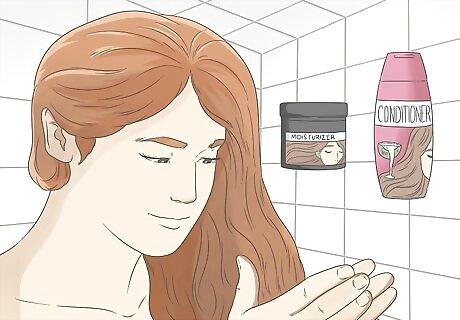
Alternate between a moisturizing and protein conditioner. Hair needs a balance of both moisture and protein to have elasticity. This means it stretches without breaking, and it is the primary indicator of your hair’s health. Protein conditioners not only penetrate the hair shaft to make it stronger, but they also form a film on the hair cuticles, or the outer layer of the hair, so they lay flat. This helps reduce frizz. Use a protein conditioner containing wheat, keratin, silk, milk, collagen or soy or a moisturizing conditioner containing jojoba oil, glycerin (or vegetable glycerin), aloe vera, shea butter or Vitamin E. You can alternate between the two daily, every few days or weekly. You may even use one more often than the other depending upon your hair’s texture and how often you use heat to style it. Use a protein conditioner more often if your hair feels dry and frizzy, stretches a great deal but still breaks, feels limp when wet or if it doesn’t hold its curl or style very well. Use a moisturizing conditioner more often if your hair breaks or snaps very easily, feels brittle or straw-like, or doesn’t stretch much or at all.
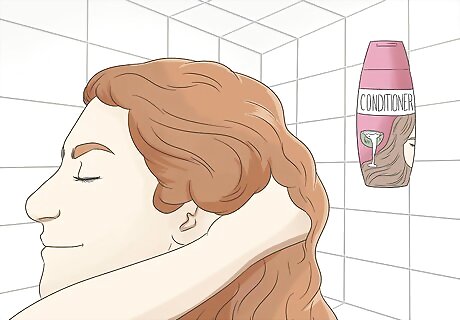
Try “co-washing” your hair with conditioner instead. The “co-washing” movement calls for primarily skipping shampoo because it strips away natural oils over time. Instead it recommends using a gentle cleansing conditioner. Choose a conditioner that is designed for co-washing or that says it’s a cleansing conditioner. They often will label themselves as such and contain natural ingredients like aloe vera. Avoid any with silicones because they will weigh down hair. Wash hair with a cleansing conditioner every 3-7 days depending upon your hair type. Wash less often the curlier and more coarse it is. Use more than you normally would, massaging it in from root to end, and let it absorb for 3-5 minutes before rinsing. Wash your hair with a sulfate-free, clarifying shampoo every 2-4 weeks because cleaning conditioners do cause build-up. Co-washing is not recommended for those with fine hair because it will weigh thin hair down and make it too oily. If you don’t know your curl type, go to sites like this to find out: [1].
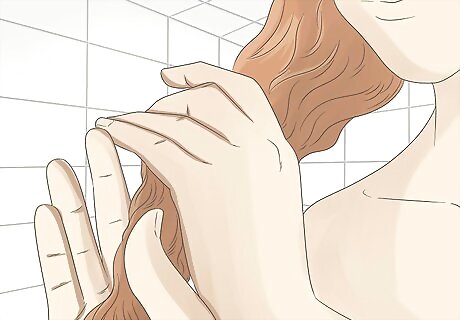
Remove excess moisture properly to speed up air drying. Never rub your hair with a towel to get it drier. Towel-drying your hair vigorously creates friction, causing your hair cuticles to roughen up. You want them to lay flat and smooth to reduce frizz. Instead, gently squeeze dripping water from your hair using your hands. Next use a towel or micro-fiber, super-absorbent cloth to soak up more water by first squeezing and then patting downward. T-shirts are a great alternative for curly hair because they’re smooth and don’t roughen up the hair’s cuticles.
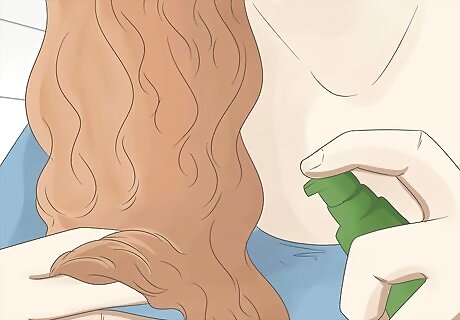
Apply a leave-in conditioner and detangle. Air drying allows hair more time to absorb moisture from the air and swell. This makes it more apt to break and the cuticle to become rough and cause frizz. Leave-in conditioners contain polymers that form a barrier or film on the hair strand, blocking humidity and reducing frizz. Comb the leave-in conditioner through your hair with a wide-toothed comb. (Using a brush to tug through your hair after you wash it is very damaging.) Focus on the mid-shaft, or the middle of the length of your hair, to the ends. Here are some detangling tips to make the process less damaging. Divide your hair into 4-8 sections and pin each up with bobby pins, flat pin curl clips or crocodile clips. Release one section at a time and use either your fingers or a wide-toothed comb to gently rake through your hair, starting at the ends and working up toward your roots. If you encounter a particularly troublesome knot, put some conditioner on your fingers to work it out. Once you have detangled a section of hair, give it a twist and pin it back up before moving on to another. When each is done, take all pins and clips out of your hair. If your hair is very thick, very curly or you have masses of curls, use a comb with long teeth that’s able to penetrate your hair.
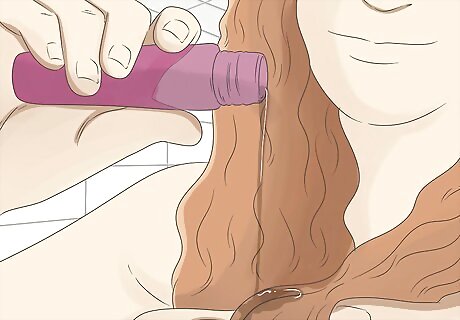
Apply the appropriate product for your hair. Air drying your hair doesn’t mean only letting it air dry. Using products make a big difference when you’re styling without heat. You should apply an anti-frizz and/or curling serum, oil, cream, gel, mousse, lotion or spray before your hair gets too dry to control frizz and to define and control/hold your curls. The type(s) you choose depends upon the texture of your hair, your curl type and how you want your curls to look. You may find that a combination of two or more works best. Serums, oils, lotions and creams are generally used to smooth. Gels and thicker creams are used most often to help control/hold or to define/shape. Mousses and foams add volume and also help define/shape. Sprays can do many of these things, in addition to add texture. Reading reviews online is a great way to help select products.
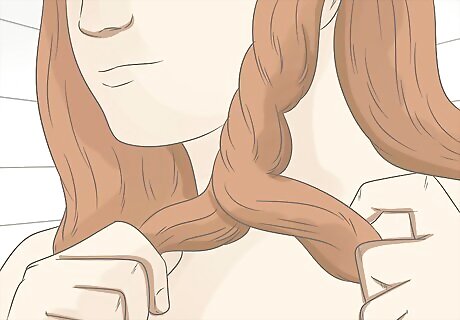
Part your hair and scrunch or twist it. Use a comb or your fingers to form your natural part. Find your natural part by combing hair back and then shaking your head. This will cause it part naturally. Then move your fingers in a zigzag motion at your scalp to lift your hair away from the roots. This will give it lift and air circulation to dry more quickly. Next use your hands to either scrunch your hair or twist it, depending upon your curl type and the look you desire. When scrunching, either stand straight or flip your head first to one side, to the other and then forward. Either way, place your hand under the end of your hair, one section at a time, and scrunch upward toward the root a few times. Then move to another section. When twisting, use your fingers to hook onto 1-3" sections of hair and twist it around your finger, moving from the bottom up, and hold for 15-30 seconds. They should be pretty well defined. If not, add a bit more product to your hair. As your hair dries, don’t touch it! Running your hands through your hair only breaks up the curls and creates flyaways and frizzy pieces of hair.
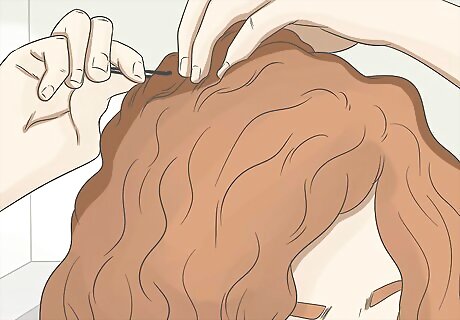
Add volume with pins and parting techniques. One of the benefits of using heat to dry your hair is that it helps lift roots to provide volume, especially at the top of your head. Here are some tricks to add volume that involve parting your hair and pinning it in different ways as it air dries. Part your hair to the side you normally wouldn't and then flip it back just before it’s dry. Create a deeper side part on the side you normally part your hair and then flip it down just before your hair is dry. Make a zigzag part, and use your fingers to part along your natural part just before your hair dries. Or you can make a zigzag part after your hair dries. Take flat pin curl clips, which won’t leave lines or marks in your hair, and clip them at the roots on the top of your head and along your part line. Remove them when your hair is dry. Use claw clips to secure rows of hair. Grab two, roughly 1-2” sections of hair near your forehead (one on each side of your part), crisscross them and secure it with a small claw clip. Make 2-4 more rows behind, or going away from your forehead.
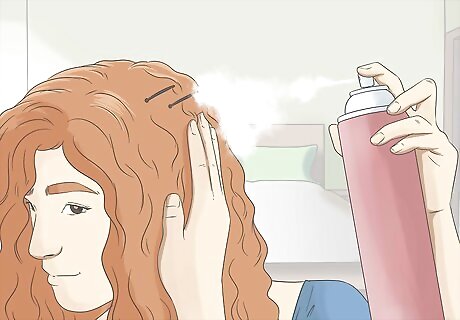
Let your hair dry and give it the finishing touches. Let your hair fully dry, and then remove any clips. Use your fingers to separate your curls unless they’ve dried in the style you prefer. If separating, use only one or two fingers to gently loosen each curl. You can loosen them more a second time; however, over-loosening isn’t an easy fix. Finish with a styling product such as these. Spritz or spray a medium-hold flexible or medium-hold humidity-resistant hairspray all over your hair. Hold the can about 12” from your head. Keep your hand moving the whole time, and use the smallest amount needed. For a textured or piece-y finish, rub a penny-sized amount of pomade between your palms. Use your fingers to apply it from the mid-shaft to the ends. Use thicker, water-soluble gels (or those with guar gum) that don’t feel sticky to help tame and control medium-to-big curls. Use denser creams for tight curls. You can also finish your hair with an anti-frizz or smoothing serum or a natural treatment oil like argan, coconut, avocado, sweet almond or grape seed. Use only a dab and rub it between your palms before either a) applying it to areas that are frizzy or need more control or b) to the ends using a twisting motion. Avoid products with silicones unless they are water-soluble or more gentle on the hair. More gentle silicones are amodimethicone, cyclomethicone/cyclopentasiloxane and trimethyl-silylamodi-methicone. Silicones that are more water-soluble include behenoxy dimethicone and stearoxy dimethicone.
Blow Drying Curly Hair
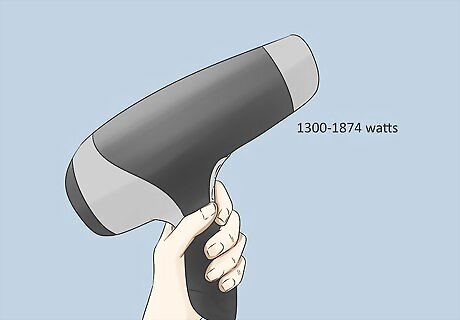
Buy the right blow dryer. All use of heat on hair is damaging in some way, particularly so for curly hair that already tends to be dry and more prone to breaking. In fact, excessive heat changes the proteins in hair that creates the signature spiral shape of curly hair. So use a blow dryer that’s no more than 1300-1874 watts (1400 watts is all you really need) with a cool shot button and multiple heat and speed settings. If you plan to dry your curly hair frequently, get a ceramic, ceramic ionic or ceramic tourmaline blow dryer. All reduce damage by either emitting infrared heat or using negative ions to break down water molecules.
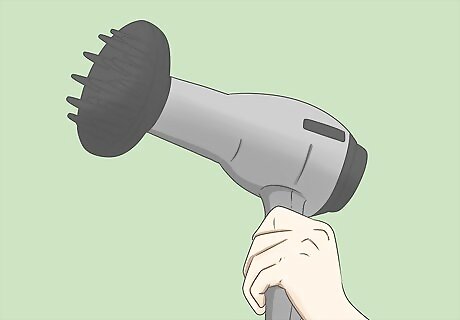
Make sure you get a diffuser. Some blow dryers come with diffusers; others do not. Yet they are crucial for blow drying curly hair because they help evenly distribute heat, create volume in heavy curls, minimize frizz, and help keep curls intact. The normal nozzle on a blow dryer blows hair everywhere, which only distorts curl patterns and creates frizz. Diffusers also enhance curls for hair that’s less wavy. Choose a diffuser that's concave in the center, or not flat, so curls can rest inside it and take shape naturally. Or buy one that has a cup-like shape in which curls can nestle. Also look for a diffuser that’s about 2½-3” wide for better heat distribution and that has at least 1-2” long “fingers” to help separate curls. They need to be long enough to reach roots for lift and volume. While many diffusers claim to fit all hair dryers, online reviewers say this isn’t always the case. You may have to go by trial-and-error. You also might buy a blow dryer that comes with a diffuser, buy a diffuser that comes with a ring or strap to help secure it to your blow dryer, or go to your blow dryer company’s product website and see if it recommends particular diffusers for your dryer model.
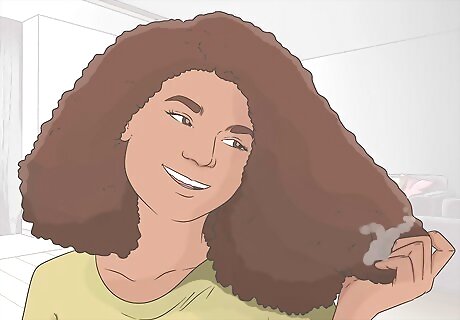
Wash and condition your hair. After you’ve washed your hair, use a wide-toothed comb to distribute either a moisturizing or protein conditioner through your hair. Unless you are-co-washing, alternating between the two on a daily or weekly basis will help to maintain the proper balance of moisture and protein hair needs for strength and elasticity. Let it absorb into your hair for a few minutes before rinsing. Then rinse your hair again with cool water to seal the cuticles. Afterward, use your hands to gently squeeze excess water from your hair. Next squeeze your hair with a t-shirt, soft towel or super-absorbent, micro-fiber cloth to soak up more water before patting downward to help cuticles lay flat.
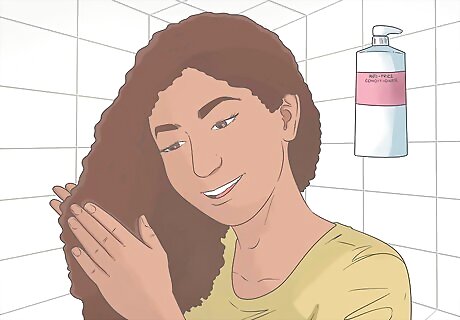
Apply an anti-frizz, curling or smoothing product and detangle your hair. Divide your hair into sections, and use a wide-toothed comb to detangle your hair. After you have detangled a section, twist it and pin it up with a clip. Once done, remove all clips. You can apply the product to each section of hair as you detangle. Or you can apply it afterward.
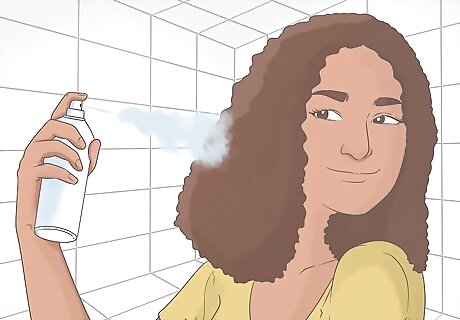
Apply a thermal protectant. Though you’ll be drying your hair on low-to-medium heat, any heat is damaging to hair. Thermal protectants form a protective barrier around each hair stand to reduce damage to hair cuticles. They also cut down on drying out the hair shaft more than necessary. Some are silicone-based and offer the most protection, but these also create the most build-up and often weigh down hair. Others are water-based and oil-based. Avoid the latter should if your hair gets greasy quickly. After you comb it through your hair, create your part, hold the ends of your hair with your hands, shake them side-to-side, and then let go so your curls bounce back up.
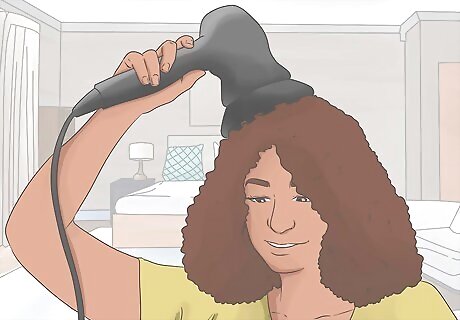
Dry your hair with the diffuser. There are a few ways to do this, and much of it depends upon the length and thickness of your hair and how much volume you want to create. For starters, though, always work in sections (you can use clips if that helps). Also blow dry on low-to-medium heat so you don’t burn your scalp and use a low-to-medium air speed setting to reduce frizz. Additionally, only dry your hair 80-95% if it’s curly, not wavy, before letting it air dry the rest of the way. Do the ends last or not at all. Both of these measures will reduce damage and frizz. One way to dry with a diffuser is to hold the blow dryer at a 90˚ angle from your head and place the diffuser at the roots of one section of hair. Start at the nape of your neck and gently hold the ends away from the blow dryer. Turn on the blow dryer and use the fingers of the diffuser to lift hair at the roots. Move in a circular direction at the same time. Another way, one that will add more volume, is to flip your head upside down and place the diffuser at the roots of your hair. Use the diffuser’s fingers to lift the roots in a circular direction. Then use the diffuser to scrunch up the mid-shaft to hold and dry. With this method, you want the roots and mid-shaft to dry completely to lock in volume. Another option is to tilt your head to one side and use your hand to cup up one section of hair from the mid-shaft to the root. Place the diffuser at the roots and hold the dryer at a 90˚ angle.Then turn on the blow dryer and dry for a couple of minutes before turning it off to move to another section. Tilt your head the opposite direction to do the other side, then start at your crown and move down. At the end, go back through using the dryer’s cool shot button to set it. Finally, if your hair is wavy and you’re trying to add more curl, place your ends in the cup of the diffuser one section at a time. Push it to your scalp and hold until dry. Some also find it beneficial to let their hair air dry for 20-30 minutes, or until it’s about 50% dry, to allow its natural curl pattern to better form. If you’re trying to enhance curl, however, you should begin drying immediately.
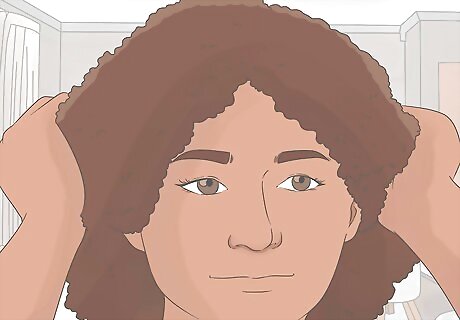
Allow your hair to completely dry and apply a finishing product. Once your hair is dry, you want to set it. Spritz or spray a medium-hold flexible or humidity-resistant hairspray in a continuous motion over your hair. You can also use a pomade, especially if your hair feels a bit crunchy, by smoothing it over, not through, your curls. Or you can finish with a drop of serum or a naturally based oil. Smooth it over frizzy spots or apply it to the ends with a twist.
Drying Your Hair Faster
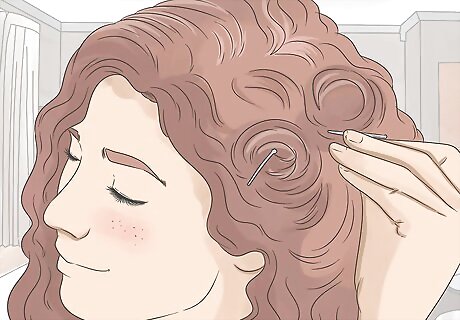
Pin-curl hair and wrap it. Drying mid-to-long curly hair with heat will typically take 30 minutes, if not much longer. If you don’t have this time, the best choice in many cases is to set and wrap your hair before you go to sleep. While your hair is still damp, not wet or dry, wind 1-2” sections toward your scalp and secure each with bobby pins. Then wrap your hair in a silk scarf to reduce flyaways. When you get up, use your fingers or a wide-toothed comb to unravel your curls and style. If your hair is particularly curly, you can also twist or braid your hair before wrapping it.
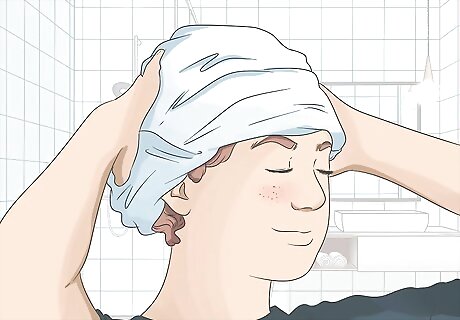
Try “plopping” your hair to cut down on drying time. The idea behind plopping is that it not only reduces how long it takes your hair to dry but it also helps create a more polished curly look. Because your curls will stack on top of each other through plopping, they will have more spring and shape, and you’ll get more volume at your roots. Wash, condition and apply an anti-frizz or curling product to your hair first. Then follow these steps. Lay a large t-shirt on a flat surface with the short sleeves closest to you. Bend over and place your head in the center so your hair is lying above it on the t-shirt, and fold the end of the t-shirt over your hair and top of your head. Grab the sleeves and twist inward toward your ears. Tie it (or secure with a clip) loosely at the base of your neck. Leave it on for about 15-30 minutes and allow your hair to air dry the rest of the way.
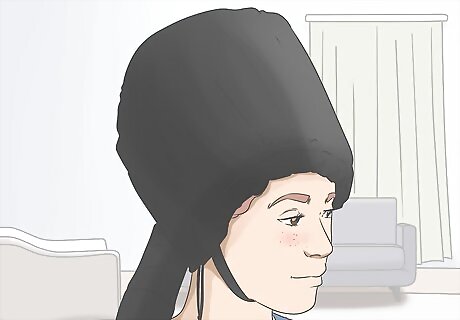
Use a bonnet dryer or hooded dryer. A bonnet dryer is a plastic cap that you wrap around your hair to dry it. It’s a more gentle method of drying hair than using a blow dryer, though it takes longer. Nonetheless, it will also speed up your total drying time if you don’t want to use a blow dryer because of its damaging effects. Hooded dryers are another less-damaging alternative. They aren’t as expensive as you might think; however, make sure you get one that is large enough to accommodate your head in rollers. Both are hands-free, too, which is an advantage.
Drying Hair to Suppress and Enhance Curl
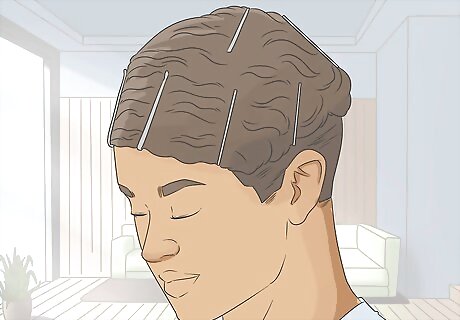
Relax curls with a “doobie” wrap. A doobie wrap – or simply doobie – is a Dominican technique for wrapping and pinning hair to straighten it. Start with your hair wet. Part it in the middle and begin on one side by combing 1-3” sections of hair straight. Pull and smooth each section with the comb around your head. Secure it with a long bobby pin at the crown of your head, the nape of your neck and the end point. Move to the other half of your hair and do the same, combing it on top of the hair that’s already pinned. Wrap a silk scarf around your hair if you’re going to sleep. Otherwise, let it air dry, or use a bonnet dryer or a hooded dryer.
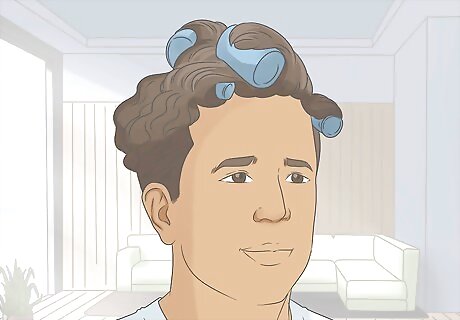
Set your hair with rollers to relax curl or straighten hair. Start by applying a setting lotion to your hair. This will help straighten it and make the straightening last longer. Use a wide-toothed comb to part your hair into sections, and roll 2-4” sections of hair onto 2-4” metal or mesh rollers. Pull tight at the scalp because this is the area that’s most resistant to straightening. Secure each roller at the scalp with a large clip. Make sure you roll backward, away from the face. Allow your hair to dry naturally, or use a bonnet dryer or hooded dryer on a low heat before switching to cool to set your curls. You can also combine air-drying with either dryer by letting your hair air dry for awhile before using one of the dryers. Or you can dry it partially with one of the dryers and then let it air dry the rest of the way. Test to see if it’s dry by unrolling one roller at the back of your head after about 45 minutes, longer if your hair is very thick or coarse.
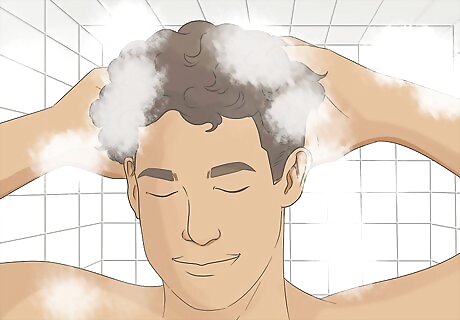
Use your shower’s steam to set curls. First, don’t turn on the vent before you shower. After you’ve washed and conditioned your hair, stay in the shower or the bathroom and let your hair soak in the steam. This will help enhance your curls. Then apply a curling or anti-frizz serum, lotion, cream, oil, etc. to your hair while it’s still quite wet.
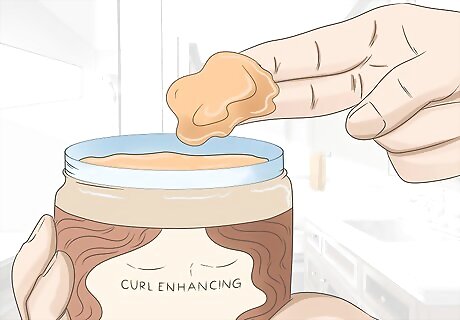
Use a curl-enhancing product. There are a number on the market, so reading reviews online is a good place to start if you don’t already use one. You don’t want to use too much of any product because it will weigh down hair, and your curls won’t last as long. Using a moisturizing conditioner and not rinsing it out enhances and holds curls unless your hair is fine or wavy. Applying mousse and then scrunching works very well for hair that is less curly. It can also help shape and define curls as well. Use roughly a nickel- to a quarter-sized amount of anti-frizz serums, creams and oils. If you go overboard, sprinkle some baby powder or dry shampoo on your hair and use your blow dryer to blast the area with cool air. If you use mousse or foam, spray out a cloud the size of a golf ball. Pat your hands together and finger comb it through your hair, starting at your roots.
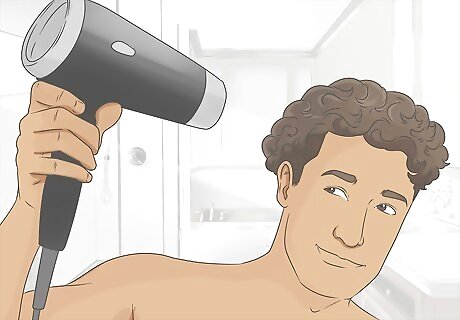
Blow dry hair straighter. This can be quite damaging to your hair, so use a thermal heat protectant and the lowest heat setting on your blow dryer. You also want to use a blow dryer with a concentrator attachment that will direct the heat so your hair isn’t flying about, creating frizz. Work in 2-3” sections, using a large, round boar bristle or nylon brush. Firmly roll under your hair as you pass over it with the blow dryer. Make sure the blow dryer is pointed in a downward direction to smooth hair cuticles. Always start at your roots and move to the ends.
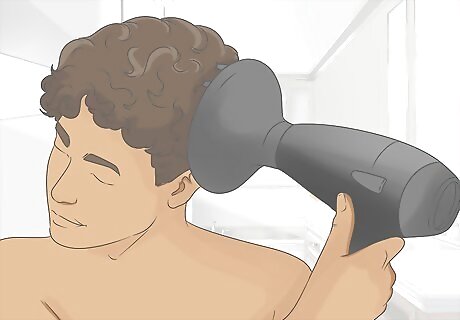
Defy gravity if you have wavy hair. The goal when trying to make wavy hair hold its wave or to make it curlier is to avoid anything that will pull on the waves. Blow drying with a diffuser is one way. Flip your head over and to the sides to scrunch whether air-drying or using a blow dryer. Use lower heat and speed settings when using a blow dryer for a more gentle dry that won’t stretch or blow out curls.












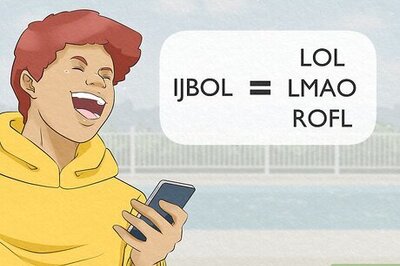




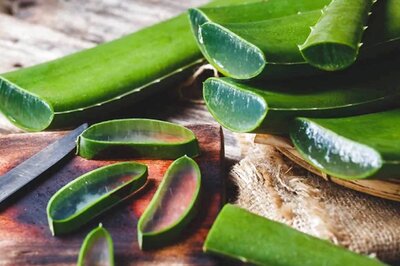
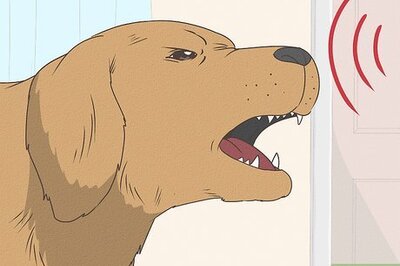

Comments
0 comment